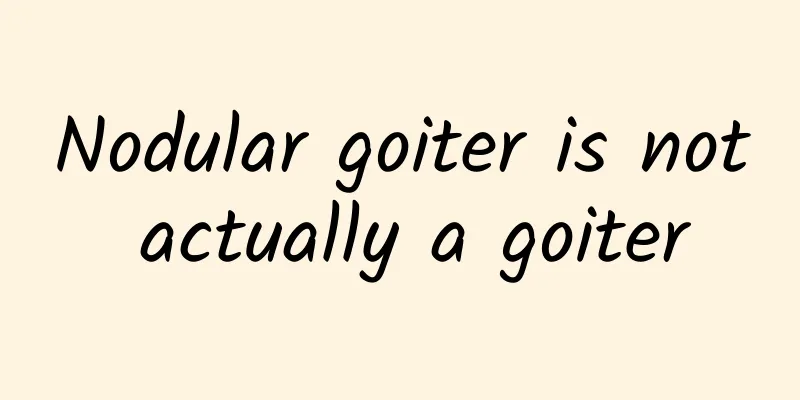Nodular goiter is not actually a goiter

|
This is the 5299th article of Da Yi Xiao Hu When your doctor tells you that you have "nodular goiter", you may have a lot of questions: What is nodular goiter? Do I have an enlarged thyroid gland? Will I have hyperthyroidism? But in fact, nodular goiter is not the "enlarged thyroid gland" you imagine, but a nodule or small lump in the thyroid gland. It is not exactly the same as a goiter, and in some cases, it does not even mean a lesion in the thyroid gland. Although most nodules are not a big problem, it is still very important to correctly recognize and understand nodular goiter. This article will help you figure out what nodular goiter is, when you need to worry, and when you can rest assured. What is a nodular goiter? The thyroid gland is a small, butterfly-shaped gland located in the front of the neck, below the throat. It is one of the important endocrine glands in the human body, responsible for the synthesis and secretion of several key hormones, the most important of which is thyroid hormone. Through the secretion of hormones, the thyroid gland plays a very important role in many physiological processes in the human body, especially in the control of metabolism, energy consumption, body temperature regulation, and growth and development. It can be said that the thyroid gland plays a role similar to a "regulator" in the body, ensuring the normal functioning of various mechanisms of the body. Nodular goiter refers to the growth of small nodules or lumps in the thyroid gland. These nodules may be single or multiple in the thyroid tissue and can usually be found through ultrasound examination. Unlike "goiter", nodular goiter is not necessarily accompanied by an increase in the overall volume of the thyroid gland. In fact, "nodules" are localized hyperplasia of tissue in the thyroid gland. In most cases, nodular goiter does not cause changes in thyroid function. Causes of nodular goiter There are many causes of nodular goiter, the most common ones are as follows: 1. Iodine deficiency Iodine is a key element in the synthesis of thyroid hormones. If the diet is deficient in iodine for a long time, the thyroid gland may not be able to synthesize enough hormones and may proliferate and form nodules. 2. Thyroid inflammation Diseases such as chronic thyroiditis can cause local changes in thyroid tissue and form nodules. 3. Genetic factors People with a family history have a higher risk of developing thyroid nodules. 4. Abnormal thyroid function For example, when the thyroid gland is overactive or underactive, it may cause local tissue proliferation and the formation of nodules. 5. Abnormal growth and development Thyroid nodules may occur due to rapid growth and development during puberty, which leads to a relative lack of iodine in the body. 6. Age and Gender The incidence of thyroid nodules increases with age, especially in women. Is nodular goiter harmful to health? Most nodular goiters are benign and do not pose a serious threat to health. Especially in the absence of symptoms, these nodules usually do not require immediate treatment. But in fact, whether it is a health hazard depends on the nature, size, number of nodules and whether it causes changes in thyroid function. The following is a detailed analysis of different situations: 1. Benign nodules Most nodular goiters are benign and harmless. These nodules usually do not affect the normal function of the thyroid gland and do not cause pain or other obvious symptoms. Many people may never have any health problems due to these nodules in their lifetime. Therefore, for this condition, no special treatment is usually needed, just regular follow-up examinations to monitor changes in the nodules. 2. Malignant nodules (thyroid cancer) Although most nodules are benign, a few may be malignant, i.e. thyroid cancer. The risk of malignant nodules is relatively low, but if not discovered and treated in time, it may cause the spread of thyroid cancer and affect health. Therefore, for malignant nodules, we advocate early detection, early diagnosis, and early treatment. Doctors can confirm the nature of the nodules through methods such as ultrasound examination and fine needle aspiration biopsy. 3. Nodules that affect thyroid function Some nodules may affect the normal function of the thyroid gland. For example, some nodules can cause excessive or insufficient secretion of thyroid hormones, leading to hyperthyroidism (hyperthyroidism) or hypothyroidism (hypothyroidism). These changes in hormone levels may cause a series of health problems: For example, hyperthyroidism may cause symptoms such as accelerated heart rate, weight loss, anxiety, and increased sweating. Hypothyroidism can cause symptoms such as fatigue, weight gain, depression, and dry skin. If nodules cause abnormal thyroid function, it may need to be controlled through medication or surgery. 4. The nodules are too large or compress surrounding tissues When the nodules grow larger, they may compress the surrounding tissues (such as the trachea, esophagus, etc.), causing some uncomfortable symptoms such as difficulty breathing, difficulty swallowing, or hoarseness. This situation usually requires surgical treatment to remove the nodules or relieve the pressure. 5. Complications of nodules In rare cases, if the nodule develops complications such as bleeding or infection, it may cause local pain or other symptoms. How is nodular goiter diagnosed? 1. Ultrasound examination Ultrasound is the most commonly used and effective non-invasive examination method for examining thyroid nodules. It can help doctors see the size, shape, number and other information of the nodules, thereby judging the risk of nodules. 2. Thyroid function test By testing the hormone levels in the blood, such as TSH, T3, T4, etc., doctors can understand the function of the thyroid gland and determine whether nodules affect thyroid function. 3. Fine needle aspiration biopsy If the ultrasound examination indicates that the nodule may be malignant (such as irregular shape and unclear borders), the doctor may recommend a fine needle aspiration biopsy. This test uses a fine needle to extract a sample of cells from the nodule and send it for pathological examination, which can help confirm whether the nodule is thyroid cancer. If nodular goiter is diagnosed, what should we do? Many people may feel anxious or uneasy when they find out that they have nodular goiter, but in fact, most nodular goiters are benign and do not pose a serious threat to health. The correct way to deal with it is to seek medical attention in time, confirm the nature of the nodule through examination, and take appropriate actions according to the doctor's advice. 1. Regular follow-up and observation For most benign nodular goiters, doctors usually recommend regular follow-up. Often after an initial evaluation, if the nodule is benign and not causing symptoms, doctors may not treat it right away but instead schedule regular tests, such as annual ultrasounds, to watch for changes in the nodule. 2. Take treatment measures If the nodule is large or has affected thyroid function (such as causing hyperthyroidism or hypothyroidism), or if the nodule presses on nearby organs (such as the trachea or esophagus), treatment may be needed, including: (1) Drug treatment : If the nodule causes abnormal thyroid function, the doctor may use drugs to regulate thyroid hormone levels and restore normal function. (2) Surgical treatment : If the nodule is large, affects surrounding organs, or is found to be malignant through examination, surgery may be required to remove the nodule or part of the thyroid gland. 3. Maintain a healthy lifestyle While the development of nodular goiter is not entirely determined by lifestyle habits, maintaining a healthy lifestyle can help keep your thyroid healthy. (1) Balanced diet : Do not consume iodine-free salt easily. Ensure adequate iodine intake to avoid iodine deficiency. (2) Regular check-ups : People with a family history of thyroid disease should undergo regular thyroid check-ups to detect problems as early as possible. (3) Maintain mental health : Avoid excessive anxiety. Regular physical examinations can help detect problems early and reduce unnecessary worries. Summarize Nodular goiter is not an enlarged thyroid gland, it is just a nodule inside the thyroid gland. Most nodular goiters are benign and there is no need to worry too much, but a small number of nodules may be malignant, so regular checkups are very important. If you find that you have a thyroid nodule, see a doctor in time and follow the doctor's advice, and undergo necessary examinations and treatments. It can usually be controlled and treated. By understanding the knowledge about nodular goiter, we can face thyroid-related health problems more rationally. If you find that you have symptoms of thyroid nodules, or have been diagnosed with nodular goiter, remember to seek medical attention in time and follow the doctor's advice for regular examinations and treatment. Author: Sui Xin Reviewer: Qian Mingping |
<<: These symptoms may be a sign of lymphoma
>>: Flat foot series popular science --- treatment of flat foot
Recommend
Signs of pregnancy in the first month
Regardless of whether a woman has had pregnancy e...
Female right foot front sole pain when walking
Pain on the forefoot of a woman's right leg w...
What to do about vaginal dryness
Some female patients have vaginal dryness, which ...
Clinical manifestations of right adnexal cyst
The main type of right adnexal cyst is ovarian cy...
What is the difference between mousse cake and chiffon cake? What is the difference between mousse cake and cheesecake?
Cakes are quite common in the market. Everyone fr...
Will exercising more increase breast milk?
During pregnancy, women's body shape will bec...
How to check if the endometrium is normal
The endometrium is located in the uterus and has ...
What is the cause of postmenopausal bleeding?
When a woman reaches menopause, the cessation of ...
How much pelvic fluid is normal during ovulation?
I believe many women are familiar with pelvic eff...
How to survive the weaning period
In daily life, breastfeeding women may experience...
What should women eat to repair the endometrium
The endometrium is a relatively important reprodu...
What causes female frigidity?
The causes of sexual indifference can be divided ...
What is the cause of acne on the labia majora?
The labia majora is a very private area of wome...
I always feel like peeing, what's going on?
The structure of women's urinary system is ve...
What causes vaginal bleeding after sex?
In life, some women find that they have vaginal b...









